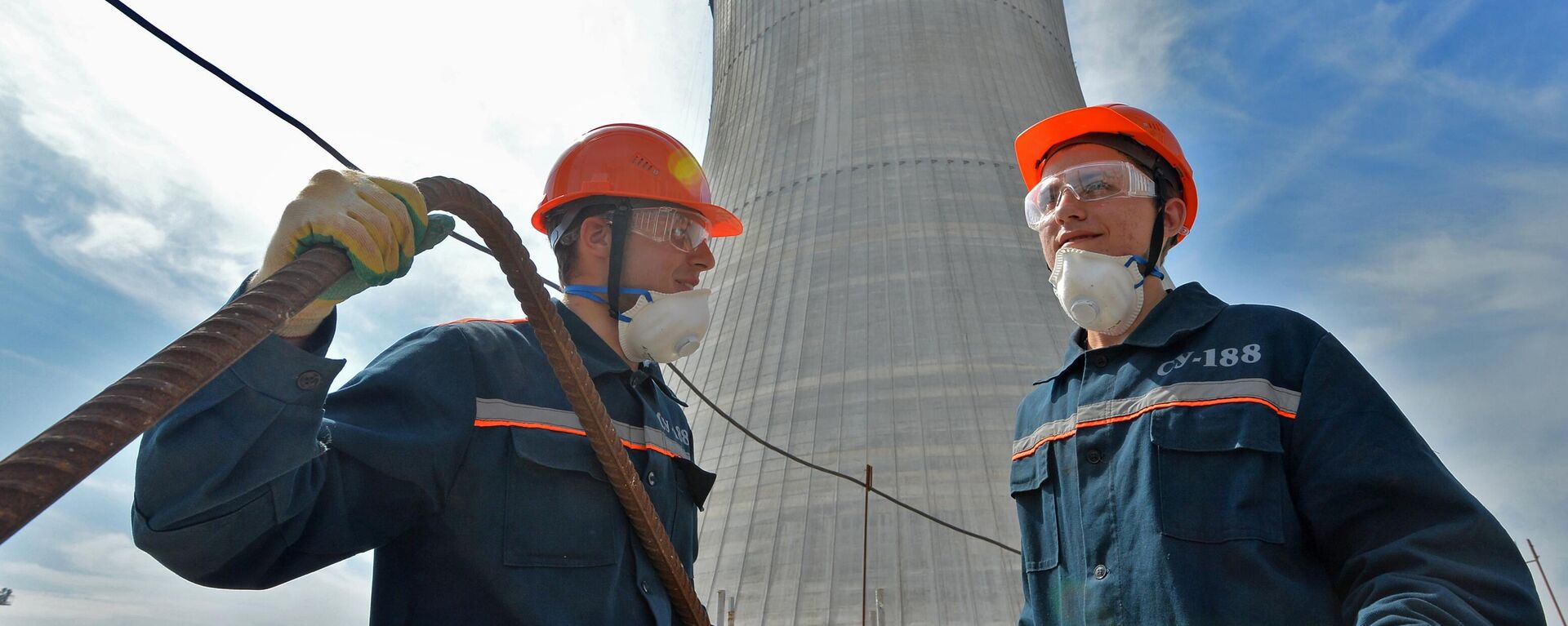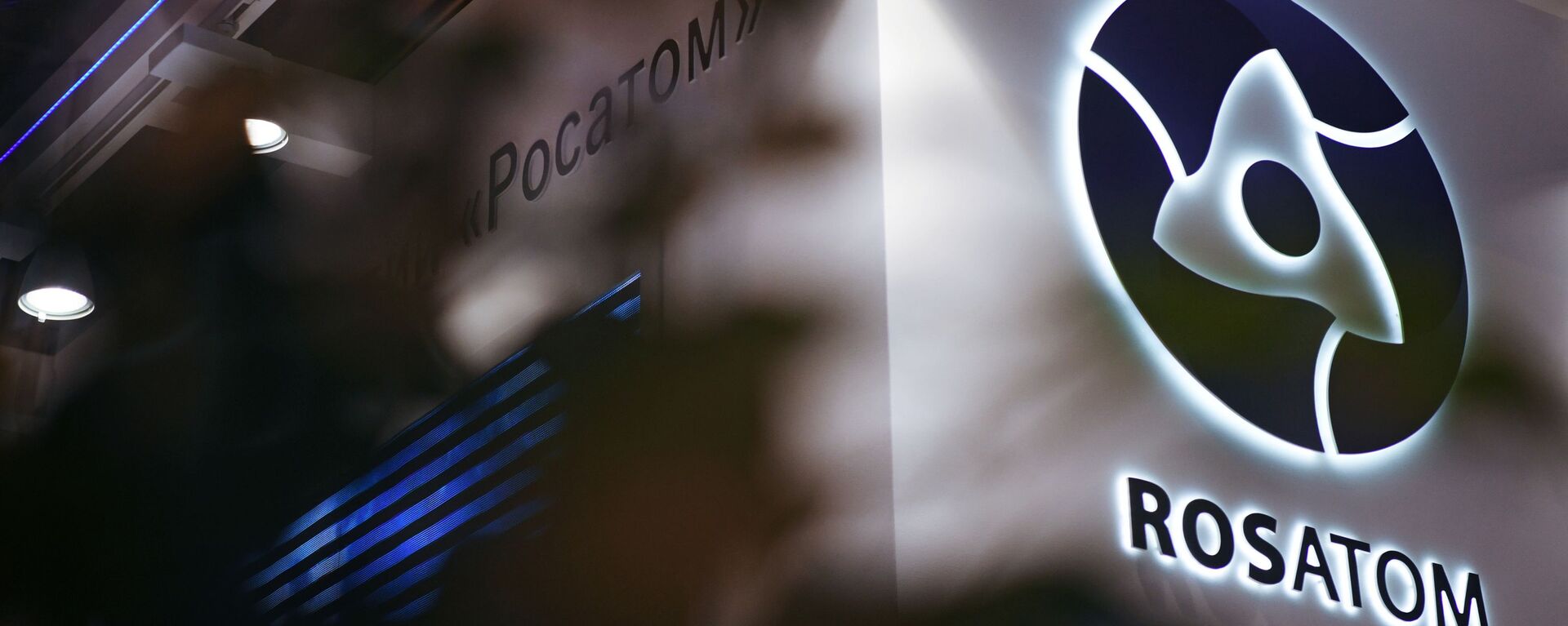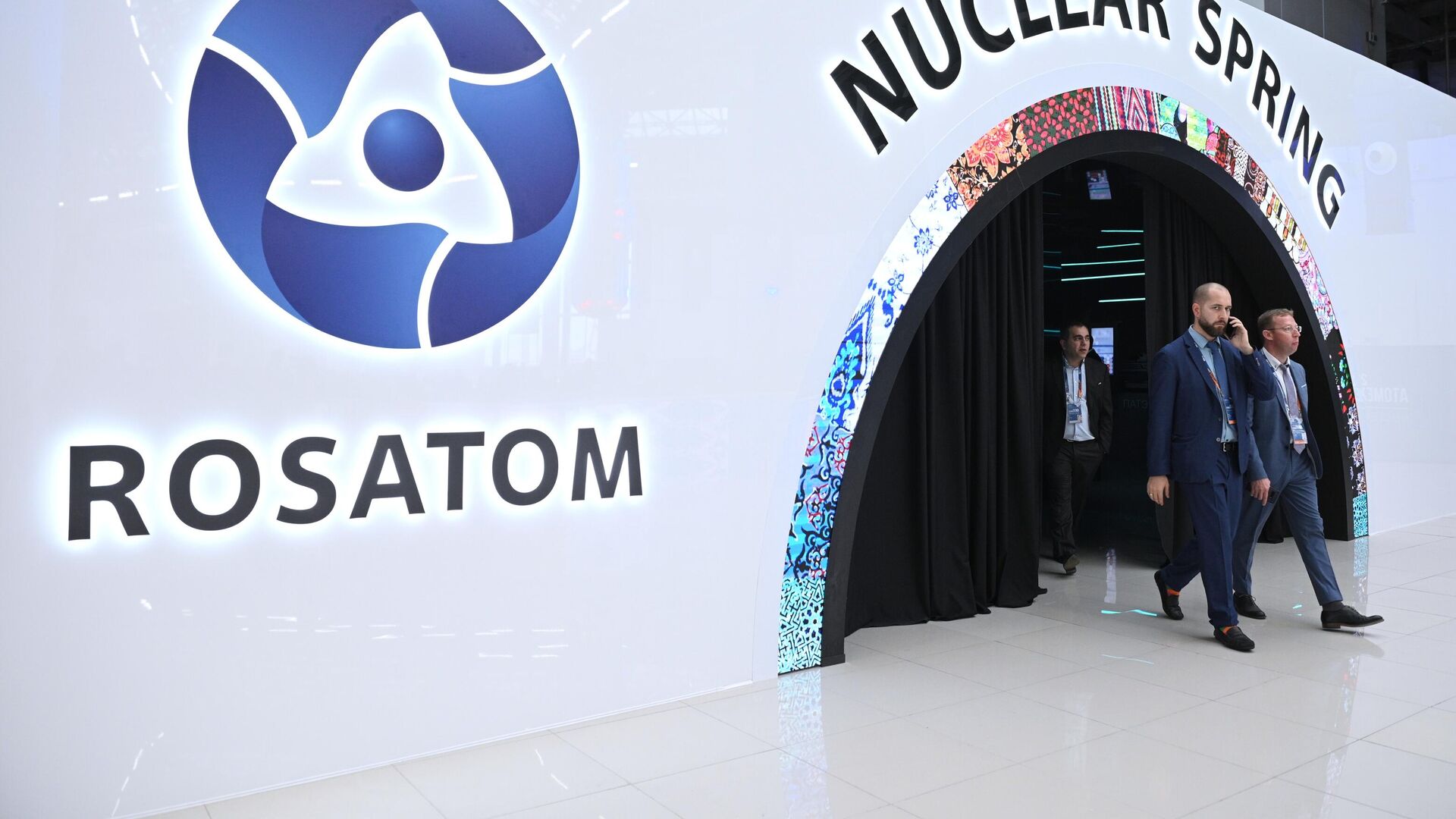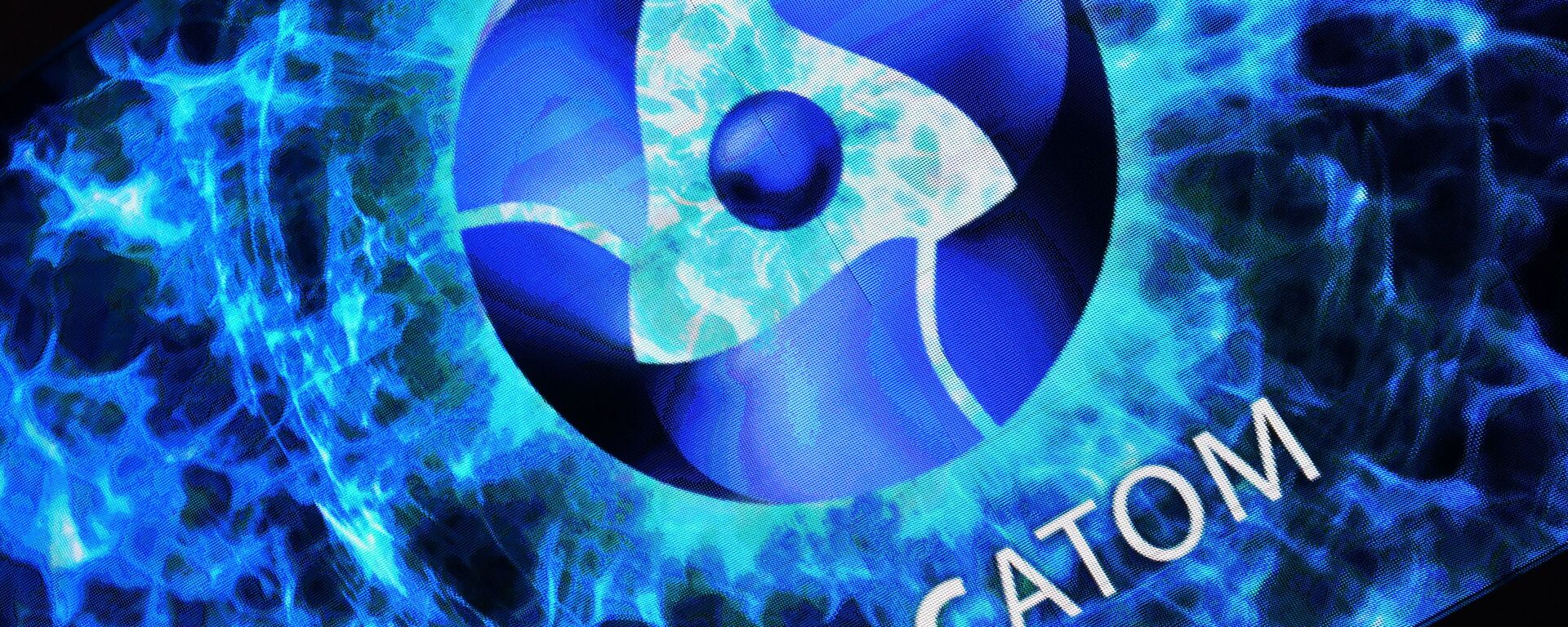https://sputnikglobe.com/20230226/ironclad-ties-why-eu-avoids-sanctioning-russias-nuclear-sector-1107820722.html
Ironclad Ties? Why EU Avoids Sanctioning Russia's Nuclear Sector
Ironclad Ties? Why EU Avoids Sanctioning Russia's Nuclear Sector
Sputnik International
Hungary revealed on Saturday that it would have vetoed the European Union's 10th package of sanctions against Moscow if they had contained restrictions... 26.02.2023, Sputnik International
2023-02-26T13:31+0000
2023-02-26T13:31+0000
2023-04-12T17:05+0000
analysis
europe
nuclear power
sanctions
us sanctions
eu sanctions
russia
rosatom
hungary
western europe
https://cdn1.img.sputnikglobe.com/img/07e6/0b/16/1104545559_0:294:3119:2048_1920x0_80_0_0_8a858bd48f9ce98645a1d8886c622fc2.jpg
Earlier this week, the EU approached a new package of sanctions against Russia over the latter's special operation to demilitarize and de-Nazify Ukraine, which started on February 24, 2022.The tenth batch is targets 87 Russian nationals and 34 entities, including financial institutions, the Russian Defense Ministry and intelligence agency SVR, the Khrunichev state space research center, and the Rossiya Segodnya media group.However, Russia's nuclear industry has not been included in the blacklist. Despite phasing out and banning Russia's major energy commodities such as oil, petroleum products, gas and coal, the European bloc seems to be unwilling to ban atomic energy.Head of the Hungarian Prime Minister's Office Gergely Gulyas put it straight on Saturday: when asked at a briefing in what way the new EU sanctions target Russian nuclear power, Gulyas replied, "In no way, otherwise we would have vetoed them."Budapest has a good reason to say so: Hungary's Paks nuclear power plant, equipped with four Russian-built VVER 440 reactors, reportedly generate about half of the country's power and receive specific nuclear fuel from Russia.Hungary is not the only EU country exploiting Russia's nuclear reactors: in fact there are about 18 Russia-designed reactors in the bloc. The list of countries which have Russian-made nuclear equipment includes Slovakia, Hungary, Finland, Bulgaria, and the Czech Republic. Those who have collaborated with Rosatom over the past two decades include France, Sweden, Germany, the UK and the Netherlands (as per Greenpeace).Western mainstream media has already bemoaned the fact that the EU-Russia nuclear cooperation is "the habit Europe just can’t break."According to the EU’s Euratom Supply Agency (ESA), in 2021, Russia's Rosatom nuclear corporation supplied the union's reactors with 20% of their natural uranium and provided the bloc with a considerable amount of conversion and enrichment services."Deliveries of separative work from Russia to EU utilities accounted for 31% of total deliveries, an 8% increase from the year before," the ESA analysis read. As for mining origin, Niger, Kazakhstan, Russia, Australia and Canada together provided 96% of the natural uranium delivered to the EU, the agency specified. Meanwhile, in 2021, EU member states spent €210 million on raw uranium imports from Russia.Rosatom's global outreach is continuing to grow, while in the EU, the value of Russia's nuclear exports rose in a number of EU states, including Slovakia, Hungary and Finland, according to research from the Royal United Services Institute (RUSI) obtained by Politico.ESA pointed out that the EU is determined to bring its dependence on Russia's atomic energy to an end: "Diversification options are also important for Member States currently dependent on Russia for nuclear fuel for their reactors serving either power generation or non-power uses. This requires working within the EU and with international partners to secure alternative sources of uranium and boosting the conversion, enrichment and fuel fabrication capacities available in Europe or in EU’s global partners."However, it will take time and effort to diversify Russia's atomic-related supplies. For instance, Bulgaria and the Czech Republic have inked contracts with US firm Westinghouse to replace the Russian fuel but the transition process could take at least three years. When it comes to the diversification of enrichment and conversion services it could take seven to ten years, according to ESA head Agnieszka Kaźmierczak, as quoted by western media.At the same time, this month a new Mochovce-3 Soviet VVER-design reactor came online in Slovakia. Earlier, TVEL Fuel Company of Rosatom and the Slovak power generation company Slovenské elektrárne a.s. signed a contract for the supply of nuclear fuel to nuclear power plants in Slovakia for 2022-2026 with the possibility of a contract extension to 2030.Likewise, Hungary is deepening its ties with Russia: in August 2022, Budapest issued an authorization to Rosatom to construct two new nuclear reactors in the country.What's more, while the EU can justify abandoning Russia's fossil fuels by its ambitious green initiatives, nuclear power is considered by many to be quite green and, above all, more reliable than most renewables, including solar, wind, hydro, biofuels and others. "We need steep decarbonization to fight climate change and nuclear power can help us get there," as Rafael Grossi, director general of the International Atomic Energy Agency, announced in April 2021.
https://sputnikglobe.com/20230225/russian-nuclear-power-not-targeted-in-eus-new-package-of-sanctions-budapest-says-1107805462.html
https://sputnikglobe.com/20230127/rosatom-hopes-reach-agreement-with-argentina-on-safe-nuclear-waste-management-says-companys-top-1106769675.html
https://sputnikglobe.com/20210612/brest-fast-neutron-reactor-russia-offers-a-new-nuclear-paradigm-for-sustainable-development-1083133471.html
russia
hungary
western europe
central europe
ukraine
Sputnik International
feedback@sputniknews.com
+74956456601
MIA „Rosiya Segodnya“
2023
News
en_EN
Sputnik International
feedback@sputniknews.com
+74956456601
MIA „Rosiya Segodnya“
Sputnik International
feedback@sputniknews.com
+74956456601
MIA „Rosiya Segodnya“
eu's 10th package of sanctions, eu does not ban russian nuclear power, rosatom, hungary's vver reactors, russian nuclear fuel still come to eu, why eu cannot bar russian nuclear fuel, russian uranium, rosatom enrichment services, slovakia's new vver reactor, hungary expanding nuclear cooperation with russia, nuclear power is green, fossil fuels
eu's 10th package of sanctions, eu does not ban russian nuclear power, rosatom, hungary's vver reactors, russian nuclear fuel still come to eu, why eu cannot bar russian nuclear fuel, russian uranium, rosatom enrichment services, slovakia's new vver reactor, hungary expanding nuclear cooperation with russia, nuclear power is green, fossil fuels
Ironclad Ties? Why EU Avoids Sanctioning Russia's Nuclear Sector
13:31 GMT 26.02.2023 (Updated: 17:05 GMT 12.04.2023) Hungary revealed on Saturday that it would have vetoed the European Union's 10th package of sanctions against Moscow if they had contained restrictions targeting Russia's nuclear sector. What's behind this stance?
Earlier this week, the EU approached a new package of sanctions against Russia over the latter's special operation to demilitarize and de-Nazify Ukraine, which started on February 24, 2022.
The tenth batch is targets
87 Russian nationals and 34 entities, including financial institutions, the Russian Defense Ministry and intelligence agency SVR, the Khrunichev state space research center, and
the Rossiya Segodnya media group.
However, Russia's nuclear industry has not been included in the blacklist. Despite phasing out and banning Russia's major energy commodities such as oil, petroleum products, gas and coal, the European bloc seems to be unwilling to ban atomic energy.
Head of the Hungarian Prime Minister's Office Gergely Gulyas put it straight on Saturday: when asked at a briefing in what way the new EU sanctions target Russian nuclear power, Gulyas replied, "In no way, otherwise we would have vetoed them."

25 February 2023, 15:49 GMT
Budapest has a good reason to say so: Hungary's Paks nuclear power plant, equipped with four Russian-built VVER 440 reactors, reportedly generate about half of the country's power and receive specific nuclear fuel from Russia.
Hungary is not the only EU country exploiting Russia's nuclear reactors: in fact there are about 18 Russia-designed reactors in the bloc. The list of countries which have Russian-made nuclear equipment includes Slovakia, Hungary, Finland, Bulgaria, and the Czech Republic. Those who have collaborated with Rosatom over the past two decades include France, Sweden, Germany, the UK and the Netherlands (as per Greenpeace).
Western mainstream media has already bemoaned the fact that the EU-Russia nuclear cooperation is "the habit Europe just can’t break."
According to the EU’s Euratom Supply Agency (ESA), in 2021, Russia's Rosatom nuclear corporation supplied the union's reactors with 20% of their natural uranium and provided the bloc with a considerable amount of conversion and enrichment services.
"Deliveries of separative work from Russia to EU utilities accounted for 31% of total deliveries, an 8% increase from the year before," the ESA analysis read. As for mining origin, Niger, Kazakhstan, Russia, Australia and Canada together provided 96% of the natural uranium delivered to the EU, the agency specified. Meanwhile, in 2021, EU member states spent €210 million on raw uranium imports from Russia.

27 January 2023, 16:02 GMT
Rosatom's global outreach is continuing to grow, while in the EU, the value of Russia's nuclear exports rose in a number of EU states, including Slovakia, Hungary and Finland, according to research from the Royal United Services Institute (RUSI) obtained by Politico.
ESA pointed out that the EU is determined to bring its dependence on Russia's atomic energy to an end: "Diversification options are also important for Member States currently dependent on Russia for nuclear fuel for their reactors serving either power generation or non-power uses. This requires working within the EU and with international partners to secure alternative sources of uranium and boosting the conversion, enrichment and fuel fabrication capacities available in Europe or in EU’s global partners."
However, it will take time and effort to diversify Russia's atomic-related supplies. For instance, Bulgaria and the Czech Republic have inked contracts with US firm Westinghouse to replace the Russian fuel but the transition process could take at least three years. When it comes to the diversification of enrichment and conversion services it could take seven to ten years, according to ESA head Agnieszka Kaźmierczak, as quoted by western media.
At the same time, this month a new Mochovce-3 Soviet VVER-design reactor came online in Slovakia. Earlier, TVEL Fuel Company of Rosatom and the Slovak power generation company Slovenské elektrárne a.s.
signed a contract for the supply of nuclear fuel to nuclear power plants in Slovakia
for 2022-2026 with the possibility of a contract extension to 2030.
Likewise, Hungary is deepening its ties with Russia: in August 2022, Budapest issued an authorization to Rosatom to construct two new nuclear reactors in the country.
What's more, while the EU can justify abandoning Russia's fossil fuels by its ambitious green initiatives, nuclear power is considered by many to be quite green and, above all, more reliable than most renewables, including solar, wind, hydro, biofuels and others.
"We need steep decarbonization to fight climate change and nuclear power can help us get there," as Rafael Grossi, director general of the International Atomic Energy Agency, announced in April 2021.







